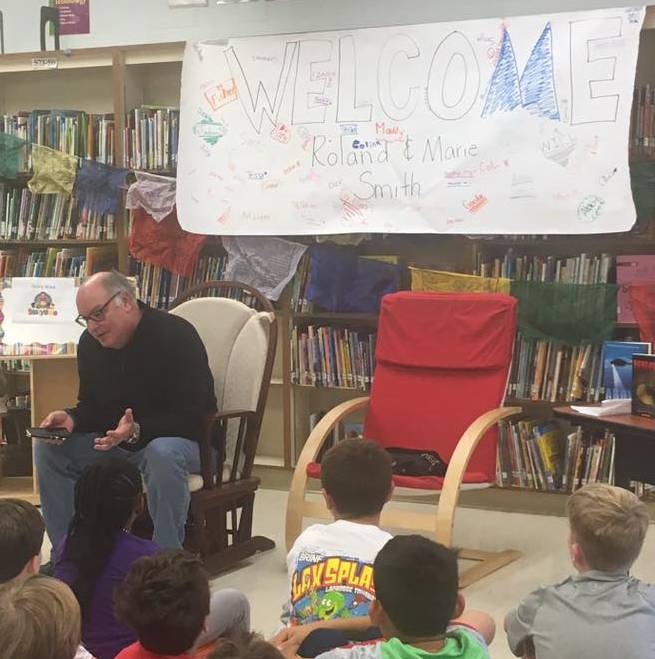Cryptid keeper: visiting YA novelist Roland Smith on reading, writing, and chupacabras
Towson University Alumni Association sponsors award-winning author's multi-event stop in Towson
By Christine Collins on November 4, 2016
A veteran animal keeper sat at the end of a long table in the Towson Room at Albert S. Cook Library Friday afternoon, with a lot of stories to tell. A longtime research biologist, he’d led a team of scientists in Alaska during the Exxon Valdez oil spill in 1989. He worked with elephants in Kenya. For more than 20 years, he was on the keeper staffs at the Oregon and Point Defiance Zoos.
He didn’t have any animals with him in the Towson Room. What he did have was a stack of books with his name on the spines.
Roland Smith has authored more than 40 books, 10 of which are nonfiction about animals, seven more of which are picture books written with his wife, Marie. But his key genre is young adult fiction that skews toward fantasy/sci-fi. Smith’s 26th novel, “Above,” from his Beneath series, was just released. He recently finished “The Aunt Farm.” The day after he wrote the last words in that book, he started writing his 28th. It will be the third in his Peak series.
“I write every day,” Smith said. “Momentum is really, really important. When you start a book, you need to finish the draft, as horrible as it is. That takes a certain amount of commitment and planning, and it’s not casual.”
Smith says he’d always wanted to be a writer, but “you always tell writers they’ve got to have a good backup job. Well, I had a very cool backup job.” Still, he got up at 4 or 5 a.m. to write for a few hours before he went to work with the animals that gave him something to write about. After his Bigfoot-inspired novel, “Sasquatch,” came out, he said, his readers were asking for a sequel.
“I didn’t want to do it. I wanted to write about cryptids.”

That’s how his Cryptid Hunters series, about twins sent to live with an anthropologist uncle when their parents disappear on a journey in the Amazon jungle, was born. Cryptids are animals that are suspected, but can’t be scientifically proven, to exist—like the chupacabra.
“If cryptids existed, they would be rare, they would be endangered,” Smith explained. “Well, I worked with endangered species, so when I’m writing about cryptids, I’m really writing about endangered species.”
While his scientific background helps with his plotlines, Smith agrees with a lot of other authors about the two most important parts of being a novelist: reading a lot and writing all the time.
He patted a small, black, banded notebook under his hand, then slid the band off and opened the notebook to reveal row upon row of neat printing in blue ink. “Each page is about 100 words. I write about five pages a day on the road, so about 500 words, and that keeps the momentum going.”
While he does own a tablet computer, Smith carries the notebook and a pen with him all the time, so he can write while his wife is in a store or taking photos.
But there’s another part of being a writer that’s very meaningful to Smith. Ask him why he has visited 125 schools this year, and he turns a bit more earnest.
“You’ve got to encourage reading,” he said. “It’s the most important skill. It will help [young readers] all their lives. So when I write a book, I’m trying to encourage readers—good readers and reluctant readers—to kind of get with it.
“I was someone who was changed by reading, honestly. I read two or three books a week, and I have for years, and that’s had a profound effect on my life. I think it would on anyone’s life. It’s important work.”
After the late morning discussion in the Cook Library’s Towson Room, Smith went to another area school to talk with young readers there. Then it was off to a small, private meet-and-greet with TU invitees in Martha’s Pub at the Auburn House. Nearly a hundred people were registered for his talk and book signing for alumni and the general public in the Auburn Pavilion from 6 to 8 p.m.
All of these events were sponsored by the Towson University Alumni Association.